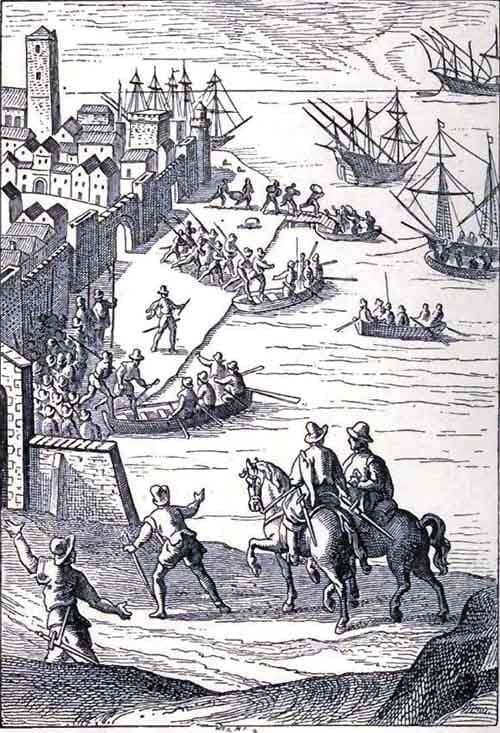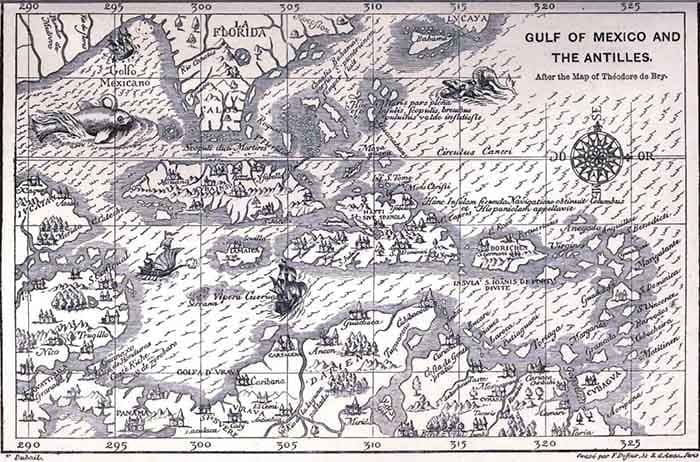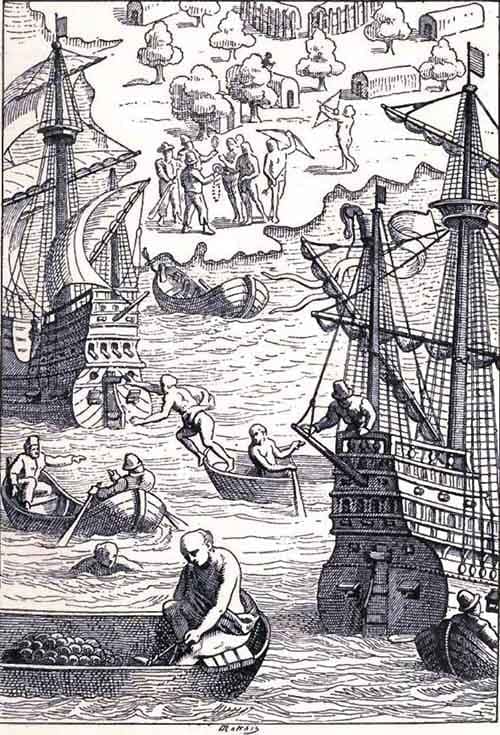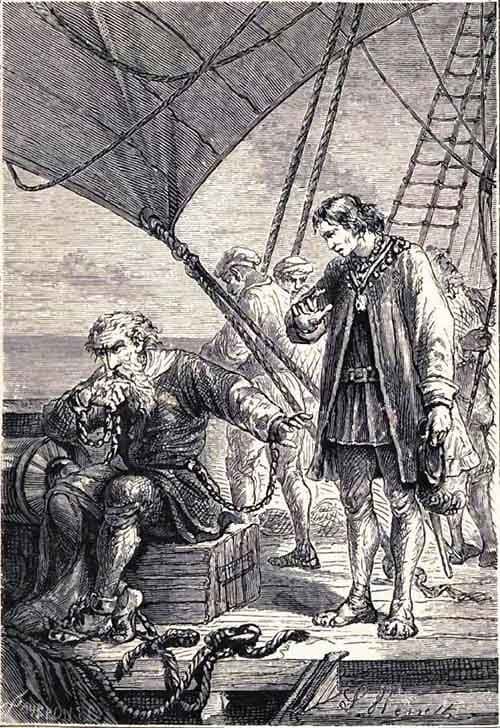CHAPTER VII. - IV.
CHRISTOPHERCOLUMBUS.
Third Voyage: Madeira—Santiago in the Cape Verd Archipelago—Trinidad—First sight of the American Coast in Venezuela, beyond the Orinoco, now the Province of Cumana—Gulf of Paria—The Gardens—Tobago—Grenada—Margarita—Cubaga—Hispaniola during the absence of Columbus—Foundation of the town of San Domingo—Arrival of Columbus—Insubordination in the Colony—Complaints in Spain—Bovadilla sent by the king to inquire into the conduct of Columbus—Columbus sent to Europe in fetters with his two brothers—His appearance before Ferdinand and Isabella—Renewal of royal favour.
Columbus had not yet given up the hope of pursuing his conquests on the further side of the Atlantic Ocean. No fatigue, no injustice from his fellow-men could stop him. After having triumphed, although not without difficulty, over the malice of his enemies, he succeeded in organizing a third expedition under the auspices of the Spanish government. The king granted him eight vessels, forty cavalry soldiers, and one hundred infantry, sixty sailors, twenty miners, fifty labourers, twenty workmen of various trades, thirty women, some doctors, and even some musicians. The admiral obtained the concession besides, that all the punishments in use in Spain should be changed into transportation to the islands. He was thus the precursor of the English in the intelligent idea of peopling new colonies with convicts, whom labour was to reform.

Columbus put to sea on the 30th of May, 1498, although he was still suffering from gout, and from the various mental trials which he had experienced since his return. Before starting, he learnt that a French fleet was lying in wait off Cape St. Vincent, with the purpose of hindering the expedition. To avoid it, Columbus made for Madeira, and anchored there; from that island he dispatched all his vessels, except three, to Hispaniola under the command of the Captains Pedro de Arana, Alonzo Sanchez of Carabajal, and Juan Antonio Columbus, one of his own relations, while he, with a large ship and two caravels bore down to the south with the intention of crossing the equator, and seeking for more southern countries, which, according to the general opinion, must be even richer in all kinds of productions. On the 27th of June the small flotilla touched at the islands of Sel and of Santiago, which form part of the Cape Verd group. It sailed again on the 4th of July, and made 360 miles to the south-west, experiencing long calms and intense heat; on arriving abreast of Sierra Leone, it steered due west, and at mid-day on the 31st of July, one of the sailors raised the cry of “land.” It was an island situated at the north-eastern extremity of South America, and very near the coast. The admiral gave it the name of Trinidad, and all the crews chanted the Salve Regina in sign of thankfulness. On the morrow, the 1st of August, at fifteen miles from the part of the land which had been first seen, the three vessels were moored near to the Point of Alcatraz, and the admiral sent some of his sailors ashore to obtain water and wood. The coast appeared to be uninhabited, but numerous footprints of animals were observed, made, as was thought, by goats.
On the 2nd of August a long canoe, manned by twenty-four natives, came towards the ships. These Indians, tall of stature, and paler in colour than those of Hispaniola, wore upon the head a turban formed of a cotton scarf of brilliant colours, and a small skirt of the same material around the body. The Spaniards endeavoured to entice them on board, by showing them mirrors and glass trinkets; the sailors even executing lively dances, in the hope of inspiring them with confidence; but the savages, taking fright at the sound of a tambourine, which seemed to them a sign of hostility, discharged a flight of arrows, and directed their canoe towards one of the caravels, whose pilot endeavoured to reassure them by steering towards them; but in vain, the canoe soon made off, and was seen no more.
Columbus again set sail, and discovered a new island which he called Gracia; but what he imagined to be an island, was, in reality, a portion of the American coast, and that part of the shore of Venezuela, which, being intersected by the numerous branches of the Orinoco, forms the Delta of that river. On this day the Continent of America, although unknown to him, was really discovered by Christopher Columbus, in that part of Venezuela which goes by the name of the Province of Cumana. Between this coast and the Island of Trinidad there is a dangerous gulf, the Gulf of Paria, in which a ship can with difficulty resist the currents which flow towards the west with great rapidity. The admiral, who believed himself to be in the open sea, was exposed to great peril in this gulf, where the rivers, falling into the sea from the continent, and being swollen at that time by an accidental flood, poured great masses of water upon the ships. Columbus, in writing to the king and queen, describes this incident in the following terms:—
“Being up on deck, at an advanced hour of the night, I heard a kind of terrible roaring; I tried to see through the darkness, and all at once I beheld a sea like a hill, as high as the ship, advancing slowly from the south towards my vessels. Opposing this great wave was a current, which met it with a frightful noise. I had no doubt then that we should be engulfed, and even now the remembrance causes me a feeling of horror. By good fortune, however, the current and the wave passed us, going towards the mouth of the canal, where, after long strife, they gradually sank to rest.”

Notwithstanding the difficulties of the navigation, Columbus continued to explore this sea, of which the waters became gradually calmer as he sailed northwards; he discovered various headlands, one of them was to the east of the Island of Trinidad, and called the Cape of Pera Blanca. Another was on the west of the promontory of Paria, and named Cape Lapa. Several harbours were also noticed, amongst others one situated at the mouth of the Orinoco, to which was given the name of the Port of Monkeys. Columbus landed on the shore, west of Point Cumana, and received a kindly welcome from the numerous inhabitants. Towards the west, beyond the point of Alcatraz, the country was magnificent, and there according to the natives, much gold and pearls were to be obtained. Here the admiral would gladly have remained for some time if he could have found a safe anchorage. But as this was impossible, he felt it best to make for Port Isabella, especially as his crews were worn down by fatigue, and his own health much affected, besides the sufferings he experienced from the bad state of his eyesight. So he sailed onwards along the Venezuelan coast, making friends as far as possible with the natives. These Indians were agreeable in feature, and of magnificent physique; their dwellings displayed a certain amount of taste, their houses being built with façades in front, and containing articles of furniture ingeniously made. The natives wore plates of gold as ornaments upon their necks. As to the country, it was superb; the rivers, the mountains, the immense forests made it a real land of delight. So the admiral gave this beautiful country the name of Gracia, and by many arguments he tried to prove that in this spot was situated that terrestrial Paradise once inhabited by Adam and Eve, being the cradle of the whole human race. To explain to a certain degree this idea of the great navigator, we must not forget that he imagined himself all this time to be on the shores of Asia. This spot which delighted him so much, he called “the Gardens.”
On the 23rd of August, after having at the expense of much danger and fatigue, overcome the perils of this bay, Columbus issued from the Gulf of Paria by the narrow strait to which he gave the name, retained to this day, of the Dragon’s Mouth. Arrived in the open sea, the Spaniards discovered the Island of Tobago situated to the north-east of Trinidad, and then, more to the north, the Island of Conception, now known as Grenada. They next steered to the south-west and returned towards the American coast; after sailing along which for 120 miles, they discovered, on the 25th of August, the populous Island of Margarita, and afterwards the Island of Cubaga, situated very close to the mainland. At this place the natives had established a pearl-fishery, and busied themselves in collecting this valuable product. Columbus sent a boat on shore, when a very profitable traffic was carried on, the natives giving in exchange for broken pottery or hawks’ bells, pounds’ weight of pearls, some of which were very large, and of the finest water.

The admiral stopped at this point of his discoveries; the temptation was strong to explore this country, but both officers and crews were exhausted. Orders were therefore given to start for San Domingo, where matters of the gravest moment demanded the presence of Columbus. Before his departure from Hispaniola he had authorized his brother to lay the foundations of a new town. With this end Don Bartolomeo had explored the different portions of the island, and having discovered at the distance of 150 miles from Isabella a magnificent harbour at the mouth of a fine river, he there marked out the first streets of a town which became later on the city of San Domingo. Here Don Bartolomeo fixed his residence, while Don Diego remained as Governor of Isabella. By this arrangement Columbus’ two brothers had the whole administration of the colony in their hands. But there were many malcontents who were ready to revolt against their authority, and it was while this bad spirit was abroad that the admiral arrived at San Domingo. He approved of all that his brothers had done, their administration having been in fact, marked by great wisdom, and he published a proclamation recalling to their obedience the Spaniards who had revolted. On the 18th of October he despatched five ships to Spain, and with them an officer commissioned to inform the king of the new discoveries, and of the state of the colony, endangered by the fomenters of disorder.
Meanwhile, the affairs of Columbus had taken a bad turn in Europe. Since his departure calumnies against himself and his brothers had been ever on the increase. Some rebels who had been expelled the colony, denounced the encroaching dynasty of the Columbus family, thus exciting the jealousy of a vain and ungrateful monarch. Even the queen, until now the constant patroness of the Genoese navigator, was indignant at the arrival on board the vessels of three hundred Indians who had been torn from their country, and who were treated as slaves. Isabella did not know that this abuse of power had been carried out unknown to Columbus and during his absence; he was held responsible for it, and to inquire into his conduct, the Court sent to Hispaniola a commander of the order of Calatrava, named Francis de Bovadilla, to whom were given the titles of Governor-general, and Intendant of Justice. He was in reality meant to supersede Columbus. Bovadilla, invested with discretionary powers, set out with two caravels towards the end of June, 1500. On the 23rd of August, the colonists sighted the two ships, which were then endeavouring to enter the harbour of San Domingo.
At this time Christopher Columbus and his brother Bartolomeo were absent, engaged in superintending the erection of a fort in the province of Xaragua; Don Diego was commanding in their absence. Bovadilla landed and went to hear mass, displaying during the ceremony a very significant ostentation; then, having summoned Don Diego before him, he ordered him to resign his office into his hands. The admiral, warned by a messenger of what was occurring, arrived in great haste. He examined the letters patent brought by Bovadilla, and having read them, he declared his willingness to recognize him as intendant of justice, but not as governor-general of the colony.
Then Bovadilla gave him a letter from the king and queen, couched in the following terms:—
“Don Christopher Columbus, our Admiral in the ocean,
“We have ordered Commander Don Francis Bovadilla to explain to you our intentions. We command you to give credit to, and to execute, whatever he shall order on our part.
“I, THE KING, I, THE QUEEN.”
In this letter, the title of Viceroy appertaining to Columbus by the solemn conventions signed by Ferdinand and Isabella, was not even mentioned. Columbus, suppressing his just indignation, quietly submitted. Then arose against the fallen admiral a whole host of false friends. All those who owed their fortune to Columbus turned against him; accusing him of having desired to render himself independent. Foolish calumnies! How could this idea have occurred to the mind of a foreigner, a Genoese, alone in the midst of a Spanish colony!
Bovadilla found the moment propitious for harsh measures. Don Diego was already imprisoned, and the governor soon ordered Don Bartolomeo and Christopher Columbus himself to be put in fetters. The admiral, accused of high treason, was placed with his two brothers on board a vessel bound for Spain, under the command of Alphonso de Villejo. That officer, a man of feeling, and ashamed of the treatment to which Columbus was exposed, wished to strike off his chains; but Columbus refused. He, the conqueror of a new world, would arrive loaded with chains in that kingdom of Spain, which he had so greatly enriched!

The admiral judged rightly in thus acting, for public opinion was revolted by the sight of him in this depth of humiliation, bound like a felon, and treated as a criminal. Gratitude towards the man of genius asserted itself against the bad passions which had been so unjustly excited, and there arose a cry of indignation against Bovadilla. The king and queen, swayed by the feelings of the people, loudly blamed the conduct of the commander, and addressed an affectionate letter to Columbus, inviting him to present himself at court.
Thus a bright day again dawned for Columbus. He appeared before Ferdinand, not as the accused, but as himself the accuser; then, his fortitude giving way under the remembrance of the unworthy treatment he had experienced, this unfortunate great man wept, and caused those around to weep with him. He pointed proudly to the story of his life. He showed himself to be almost without resources, he whom they accused of ambition, and of enriching himself out of the government of the colony! Verily, the man who had made the discovery of a world, did not possess a roof to shelter his own head!
Isabella, ever good and compassionate, wept in company with the old sailor, and for sometime could not make him any answer, so choked was she with her tears. At length she was able to utter some affectionate words; in assuring Columbus of her protection, she promised to avenge him of his enemies; she excused the bad choice they had made in sending this Bovadilla to the islands, and she declared he should expiate his guilt by an exemplary punishment. In addition, she desired the admiral to allow some time to elapse before returning to his government, in order that the minds prejudiced against him might return to sentiments of honour and justice.
The mind of Christopher Columbus was calmed by the gracious words of the queen; he showed himself content with his reception, and admitted the necessity of the delay enjoined upon him by Isabella. The chief wish of his heart was again to serve his adopted country and its sovereigns, and he sketched out grand designs of what still remained to be attempted in the way of discovery. His third voyage, in spite of its short duration, had not been without fruit, but had enriched the map with such new names as Trinidad, the Gulf of Paria, the coast of Cumana, the Islands of Tobago, of Grenada, of Margarita, and of Cubaga.

